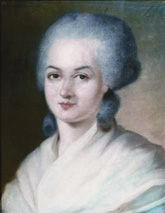19. Olympe de Gouges (1748-1793), Declaration of the Rights of Woman and the Female Citizen, 179133

In 1791, the actress, playwright, fervent participant in the Revolution, and Girondist sympathiser, Olympe de Gouges, wrote her famous Declaration of the Rights of Woman and of the Female Citizen.34 She dedicated it to the queen, Marie Antoinette, not that it helped either of them or indeed its own reception. Both perished on the guillotine within a month of each other. Olympe de Gouges’s Declaration of Rights was not adopted in any respect.
Preamble
The mothers, daughters, and sisters who together make up the female representatives of the Nation ask that they be constituted as a National Assembly. Considering ignorance of, neglect of, or contempt for the rights of women to be the sole causes of public misfortune and governmental corruption, they have resolved to set out, in a solemn declaration, the natural, inalienable, and sacred rights of woman, so that this declaration, constantly present to all members of the social body, may ceaselessly remind them of their rights and their duties; so that the acts of the female executive and of the male executive may at all times be compared to the goals of any political institution, and as a result be all the more respected; so that the demands of female citizens, founded henceforth on simple and incontestable principles, will always revolve around the maintenance of the constitution, of sound morals, and of the happiness of all. Consequently, the sex that is as superior in beauty as it is in the courage that it needs to endure the suffering of childbirth, acknowledges and declares, in the presence and under the auspices of the Supreme Being, the following Rights of Woman and of the Female Citizen:
I:
Woman is born free and remains equal to man in rights. Social distinctions may be founded only on the common good.
II:
The aim of any political association is the preservation of the natural and imprescriptible rights of woman and man: these rights are freedom, property, security, and above all resistance to oppression.
III:
The principle of any sovereignty essentially resides in the Nation, which is nothing other than the reunion of woman and man: no body and no individual may exercise any authority which does not emanate directly from the Nation.
IV:
Freedom and justice consist in returning anything that belongs to someone else to them; thus the exercise of the natural rights of woman has no limits other than those which the endless tyranny of man opposes to them; these limits must be reformed according to the laws of reason and nature. [...]
VI:
The Law should be the expression of the general will; all female citizens and citizens should take part, personally or via their representatives, in its formation; it must be the same for everyone: all citizens, female and male, being equal in its eyes, should be equally admissible to all public dignities, positions, and employments, according to their abilities, and with no other distinctions than those of their virtues and of their talents.
X:
No persons should be harassed for their opinions, whatever they regard; if woman has the right to mount the scaffold, she must equally have the right to mount the tribune, provided that what she says does disturb public order as established by the Law. [...]
XIII:
For the maintenance of the public force, and for administrative expenses, the taxation of woman and man is equal; she has her share in all publicly imposed duties and in all onerous tasks; she must therefore receive her share when it comes to the distribution of positions, employments, offices, dignities, and labour. [...]
XVI:
Any society in which the respect of rights is not guaranteed, nor the separation of powers secured, has no constitution at all: the constitution is null and void if the majority of the individuals who make up the Nation has not taken part in its drafting.
XVII:
Property belongs to both sexes, whether together or separate; for each individual, it is an inviolable and sacred right; no persons may be deprived of it, for it is the true patrimony of Nature, except when public necessity, as attested in law, manifestly requires it, and on condition of just compensation, payable in advance.
Read the free original text online, 1791 edition: https://fr.wikisource.org/wiki/Déclaration_des_droits_de_la_femme_et_de_la_citoyenne
 Listen to the free audio book (in French): https://archive.org/details/DeclarationDesDroitsDeLaFemmeEtDeLaCitoyenne
Listen to the free audio book (in French): https://archive.org/details/DeclarationDesDroitsDeLaFemmeEtDeLaCitoyenne
33 Olympe de Gouges, Déclaration des droits de la Femme et de la Citoyenne, presented to the National Assembly in 1791.
34 Portrait of Olympe de Gouges by Alexandre Kucharsky: https://commons.wikimedia.org/wiki/File:Marie-Olympe-de-Gouges.jpg







